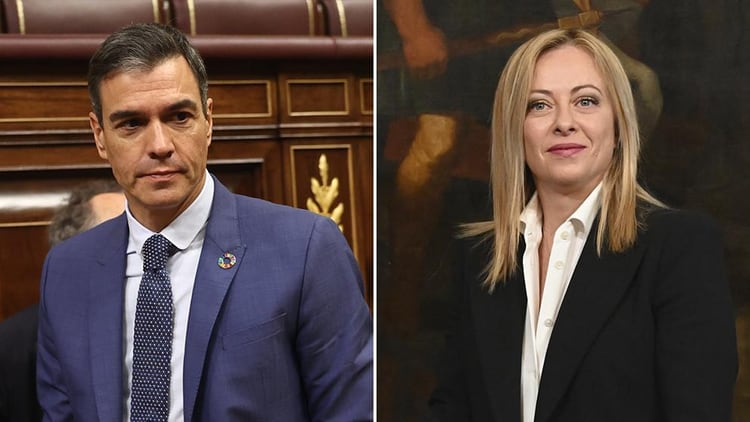The Diplomat
The President of the Government, Pedro Sánchez, wants to sound out the Italian Prime Minister, Giorgia Meloni, about her position on a possible Migration and Asylum Pact that Spain intends to reach during its six-month Presidency of the European Council.
This is what government sources suggested yesterday when explaining the objectives of Sánchez’s new tour of European capitals to prepare for the EU Presidency, which will begin on 1 July. The head of the Spanish government will be in Rome tomorrow, Wednesday, but before that he will have visited Cyprus and Malta today.
On this tour, Sánchez will continue to explain to his European colleagues the objectives he has set for the European Presidency and for which he wants to reach the greatest possible consensus. These objectives include making progress on competitiveness, reindustrialisation of Europe, open strategic autonomy, reform of the electricity market, fiscal rules and the review of the multiannual financial framework, without forgetting issues related to third regions, particularly Latin America.
The government considers that the three countries that Sánchez will now visit are somewhat aligned with Spain’s positions on many of these issues, given that they all have a similar geographical position and are members of the MED5, reports Europa Press.
However, immigration is where the most differences have arisen, especially with Italy, due to the initial position that Giorgia Meloni’s government initially maintained, rejecting the disembarkation in Italian ports of immigrants from the rescue and rescue operations carried out by NGOs.
Subsequently, at the beginning of this year, Meloni’s government approved rules for the disembarkation of rescues at sea that have proved controversial and were rejected by NGOs as contrary to international law.
For this reason, Sánchez wants to discuss the matter with his Italian counterpart to find out to what extent it will be possible to move forward or reach a migration and asylum pact during Spain’s six-month presidency of the EU.
Despite the discrepancies that may exist with the migration policy between Spain and Italy, the truth is that Italy continues to form part of the MED 5 – comprising Spain, Greece, Cyprus, Malta and Italy itself, the countries that are the main entry points for migrants to the EU. In fact, they issued a joint document on 4 March, following the last meeting of the interior ministers of these five countries.
Spanish policy on this issue has focused on agreements with ‘positive’ incentives with the migrants’ countries of origin and transit, which in addition to including return agreements, also include aid for controlling immigration and technical preparation of local authorities. Frontex is even encouraged to make this type of agreement with ‘positive’ incentives, as opposed to the policy of other countries, which propose ‘negative’ incentives using visa policy or development cooperation.
In this context, sources in the Executive point out that the President of the Government is not going to enter into national matters on immigration rules, but he does want to send the message that during the Spanish presidency of the EU he would like to reach the broadest possible consensus on this issue. Moreover, Spain wants the views of first-entry countries to be taken into account in the Migration Pact.
In any case, the aim is for agreements on this matter to be based on European migration values, which include solidarity, responsibility and humanity towards migrants.
In addition to the issues that will be dealt with as a priority by the Spanish EU semester, other issues that arise bilaterally could also be addressed with Italy, such as the potential for collaboration between the two countries on recovery plans, which are already underway and in the middle of implementation. In other words, the opportunity to carry out joint projects in areas such as digital, energy, renewables and industry.
In fact, the Executive emphasises that relations between Spain and Italy transcend governments because they are sister countries in political, economic, cultural and diplomatic terms, with many similarities in the European agenda because Spain and Italy have a very similar geographical position. They admit, however, that relations with Meloni are not as close as with Conte or Dragi.
Trade relations with Spain will result in exports to Italy worth 26.56 billion in 2021 and from Italy to Spain 22.6 billion, so the coverage rate is 117 per cent.
In contrast, Italy’s investments in Spain two years ago amounted to 723 million euros, compared to the 231 million euros that Spain invested in that country. Cultural relations are very intense, with Italy having the largest number of Spanish cultural institutions, including the four Cervantes institutes and the Royal Academy of Spain in Rome, which is celebrating its 150th anniversary.
Cyprus and Malta
On this tour, the first country Pedro Sánchez will visit will be Cyprus, where the last visit by a Spanish Prime Minister was in 2009 with José Luis Rodríguez Zapatero. The head of the Spanish government will be the first European leader to be received by the new president, Nikos Christodoulides, since he took office.
Spain is the ninth largest supplier to Cyprus, with exports worth 315 million in 2021, while exports to Spain from this country amounted to 30 million. Investment flows are small, but tend to increase in Cyprus. The company Alsa has recently landed there with several transport lines.
After the meeting and a statement without questions, the head of the Spanish Executive will travel to Malta, the smallest economy in the Eurozone, but which received 2.7 million tourists in 2019, and where Spain exports 381 million and imports 94 million. Although Malta’s investment in Spain is greater, 40 million, than the reverse, which was only 6.6 million.
Pedro Sánchez will arrive in Malta late in the afternoon and after being received by his counterpart, Prime Minister Robert Abela, they will make a joint statement, followed by a meeting and an official dinner.
The Spanish president will also discuss the issue of immigration with the leaders of Cyprus and Malta, given that they are countries of first arrival, as is the case with Italy, and Cyprus has the specific problem of the so-called Turkish Republic of Northern Cyprus, which Spain does not recognise.






